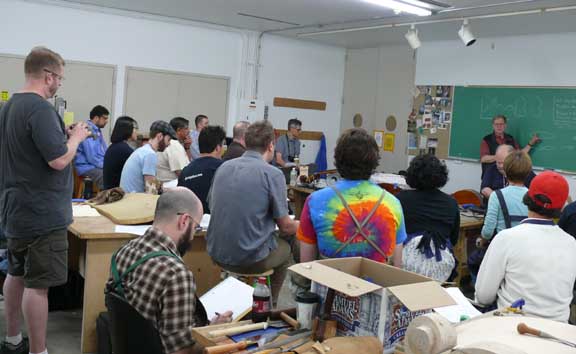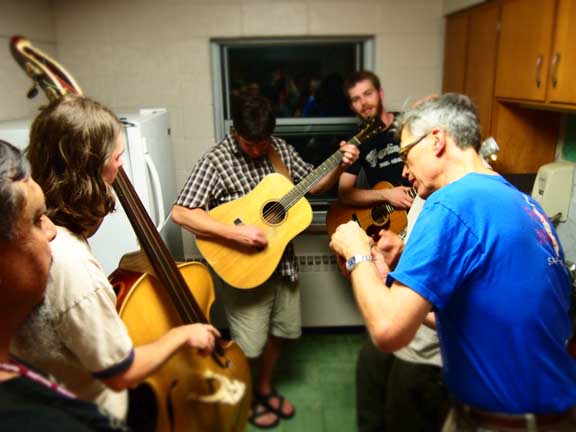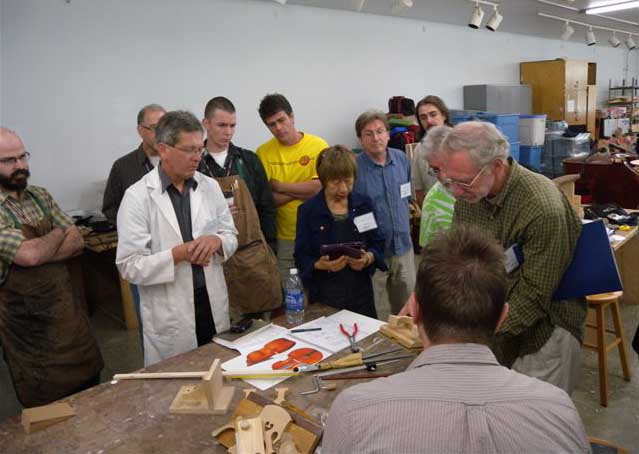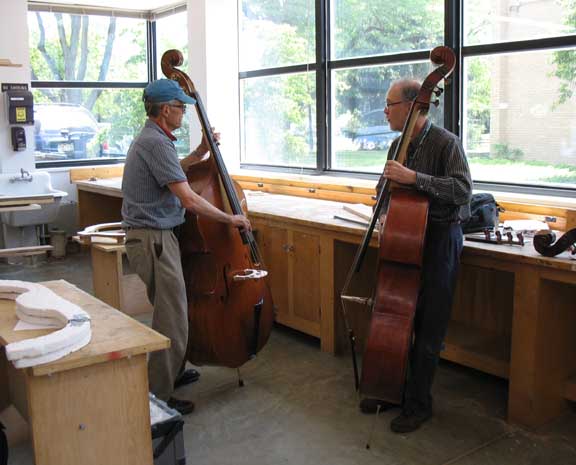

The third VSA/Oberlin Bass Workshop is scheduled for the week of June 8-13, 2014. We're looking forward to another busy but rewarding week, working together.
"Everyone teaches, everyone learns," is the basic principal established by Vakahn Nigosian, founder of the program at Oberlin. With this in mind, the Bass Workshop will bring together those interested in bass lutherie, with a mind toward sharing experience, knowledge, and ideas.
We anticipate that most participants will be professionals working in shops, perhaps bass specialists, or those in violin shops wanting to learn more about bass. We also expect we'll have some space for experienced amateurs, wanting to further develop their skills. The hope is that everyone will leave business and competitive concerns at home, with the belief that by helping each other, we raise the standards of our profession to the benefit of all.
The faculty this year will be Arnold Schnitzer, Bill Lakeberg (guest faculty), and Jay VandeKopple. David Gage will be unable to join us this year, as he is doing a major renovation of his shop. I (Jay VK) have agreed to coordinate the Workshop, and will be the contact person for questions, applications, etc. As in the past, we hope to invite guest speakers to help enhance our discussion.
Tuition for this year has been set at $1045, which includes tuition, dorm with A/C, and 5 dinners. Also, remember that the VSA sponsors this program, so attendees are expected to be VSA members. Lunch will normally be on your own. We’ve generally liked to have dinner together, and this year we’re again working with the University about using a cafeteria.

Each day during the week’s schedule, there will be presentations and demonstrations by the faculty, guests, and attendees. For a given topic the idea is not to show THE way to do it, but to share approaches or explore how things work and find out! We will actively seek and encourage contrasting ideas from all participants.
Most of each day (and evening) will be devoted to projects. We encourage participants to bring projects to work on. If you can't bring one (or prefer not to), you can certainly work with others. As we get closer to the Workshop, I'll contact everyone about what you're planning, and we'll create a Project List. Then on the first day, we'll have attendees decide which Projects they'd like to work with (more than one is likely, depending on how much needs to be done). When Project Groups get together, they can decide on how to share the work.
As a possibility, we could have a Tailpiece Project that would investigate different tailpiece weights, different string afterlengths, different tailwire lengths, and also some wolf suppressors. Ted White has been working on an adjustable tailpiece design, and I hope he may have a bass version available by 2014. We can also have an experiment, trying different strings on basses, to learn what we can about what we like.

While things will change when we get your project ideas, some topics we may
include:
1. General issues
-sharpening tools
-glue considerations
-wood selection for various needs
-setup specification guidelines
2. The fingerboard
-fitting, shaping and surfacing
-arco/pizz vibration of the string, how they differ and affect the fingerboard
3. The bridge
-methods of fitting
-selection and adaptation to players needs (classical/jazz)
4. The sound post
-fitting
-adjustment for sound and playability
5. Cracks
-causes and repair approaches ("ideal world" vs. real world)
-Innovative approaches to major repairs using vacuum bagging and steam
-Other body woodworking, such as edging, grafts, and purfling repair
6. The bassbar
-bassbar shaping theories
-methods of fitting
-approaches to repairing bassbar cracks
7. Making considerations
-designs and implications of the modern player; travel designs
-building techniques
-considering various materials and wood species
8. The tailpiece
-effect of weight and tailwire attachment
-adjustment of string afterlengths and use of wolf suppressors
9. The bow
-rehairing and repairs
10. Wolf notes
-what causes them
-how to cope with them
11. Acoustics of the double bass
-what's been done
-what's being done
-how can we use it?
12. Bass strings
-Comparisons of a variety of brands/models
13. Varnishing
-Applying new varnish
-Varnish retouching
So participants should bring tools, ready to get to work. It would be great also to bring favorite tools and jigs. As we all have to develop many of our own tools, it doesn't make sense for each of us to recreate the wheel. This should be a wonderful environment where we can share ideas, helping to move our profession forward.
For further information or an application form, contact:
Jay VandeKopple
vandekopple@fordham.edu

Faculty bios
Arnold E. Schnitzer was born on 1953 in Miami, Florida, where his father ran a cabinet shop servicing the art deco buildings of South Beach. The family, originally from the New York City region, moved back north in 1957 and he grew up in that area. After High School he received a conservatory degree in music performance/composition, achieved while working full-time playing double and electric bass in various venues. His interest in woodworking was encouraged from an early age by his father, and included experiences in boat repair, carpentry and "fixing" his own instruments. Much later, he was mentored in guitar-making by Carl Thompson, and in double bass repair by Lou DiLeone. Mr. Schnitzer's non-luthiery careers have included music instruction, sales, executive recruiting, and residential carpentry. Since 1990 he has worked exclusively as a luthier and run the small business AES Fine Instruments, currently in Brewster, NY. His hobbies include golf and sailing, and he has a weakness for nice sports cars. Along with countless repair jobs, modifications and restorations, he has hand-built 33 double basses to date. He and his wife Barbara live and work on a horse farm where neither gets enough sleep. He has two grown children; his daughter is an accomplished opera singer and Voice professor at UMass Amherst, and his son (currently finishing his Master's degree) no longer lets Dad win when golfing. Arnold writes a column for Bass Gear Magazine, and participates with David Gage and Jim Ham in the ongoing Luthier's Corner column in the ISB magazine, Bass World. Arnold was also honored by the ISB in 2013, as he was granted the Special Recognition award for Luthiery.
Bill Lakeberg was born 1954 in Oak Park, Illinois. His interest in music began in high school when he bought an old fiddle that a friend had found in her attic. In college Bill studied photography and that is where he also met his wife Margie. They have a son, Robert and a daughter, Jackie. Bill switched to violin making and attended the Kenneth Warren School of Violin making, graduating in 1979. Since that time he has worked in Seattle for David Saunders and in Indianapolis for Frank's Violins. In 1987 he settled in Cincinnati where he worked for the Bass Viol shop for 8 years doing restoration and making basses. During that time Bill also founded his own business which specialized in custom violin varnishing. Since 2007 he has been at the Cincinnati Bass Cellar working on restoration and bass making. Bill has also won numerous awards including a VSA gold medal and 3 ISB silver medals for his basses.
After studying string bass with Bill Blossom, David Gage
studied string bass
performance with David Neubert and Reggie Workman at the University of Massachusetts,
while playing electric bass with various local bands in the New England area.
Moving to New York City in 1976 to study with Dave Holland and Michael Moore,
David apprenticed in The Bass Shop of Chuck Traeger in New York City. At
this time David traveled to study acoustics and instrument construction/repair
with Carleen Hutchins in New Jersey and Lou DiLeone in Connecticut.
Since 1978 David has been President of David Gage String Instruments, a brick
and mortar shop and internet store located at 36 Walker St in lower Manhattan,
that specializes in the restoration and sales of string basses, celli and guitars.
Mr. Gage has also teamed with designer Ned Steinberger to produce a line of
pickups and other electronics for string instruments that are staples in the
industry. Originally and still primarily a string bass repair, restoration
and. maker's shop he has worked with many major symphonies and jazz artists
from around the world. The Gage Shop produces a carved copy of the classic
American Abraham Prescott string bass. The Gage Shop also specializes in several
lines of travel trunks and travel string basses to meet the contemporary demands
of the active player.
David has written and consulted on many articles written on the string bass
in such magazines as The Strad, Bass Player and Strings Magazine.
He is currently on the Board of Manhattan Youth, a community based program
that promotes after school activities for the youth of lower Manhattan, including
tutorial, arts and sports programs. David is serving his second term (previously
in late 1980's) on the Board of the International Society of Bassists. In 2007
David received the Luthier Award presented every other year at the Convention
of the International Society of Bassists.
Jay VandeKopple is a member of the VSA Board of Directors.
He had been President
of the Catgut Acoustical Society from 1999 until its merger with the VSA in
2004, and continues as Chair of the CAS Forum. He is a retired Professor of
Math/CIS, formerly at Marymount College of Fordham University. Jay has a Ph.D.
in Mathematics (with a thesis in a musical acoustics area) and a Masters in
Computer Science. An accomplished bass player, Jay freelances in the Northern
NJ area. His wife, Linda McKnight, is on the Double Bass Faculty and Manhattan
School of Music and Montclair State University in NJ. Jay has run his own bass
shop for over 35 years, part-time until his retirement from teaching in 2007
and continuing full-time since then. Jay is now beginning to make basses. His
first teacher in bass repair was Joseph Cilecek of Hastings, NY, and he studied
under Karl Roy at the UNH Violin Craftsmanship Institute.